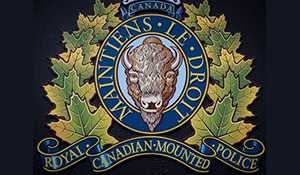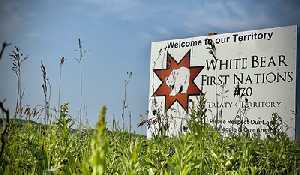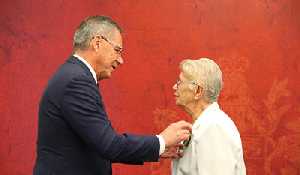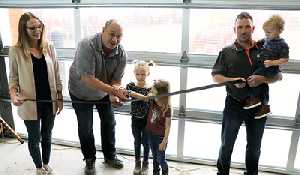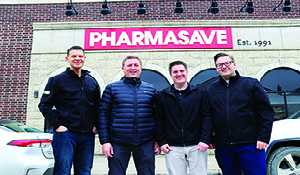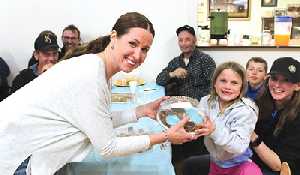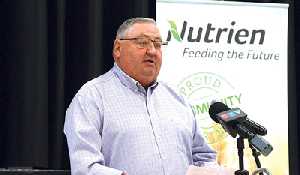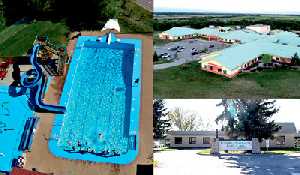Two years since Russia invaded Ukraine
75 Ukrainians have settled in Moosomin and Wawota, with more on the way
March 5, 2024, 11:41 am
Ryan Kiedrowski, Local Journalism Initiative Reporter


It’s been two years since the Russian invasion of Ukraine. Events across the province were held recently to mark the anniversary, and bring Ukrainians in Saskatchewan together in unity, sharing their experiences, strength and hope for the future. Around 6,300 Ukrainians have made Saskatchewan their home, including about 75 in the Moosomin and Wawota areas.
Roman Chernykh says it’s been a dramatic two years
Roman Chernykh has been very involved with helping those new to the area navigate their new home. He estimates there are now around 35 Ukrainians in Moosomin, and about 40 in nearby Wawota.
“It’s been a dramatic two years for families and for people that arrived from Ukraine,” he said, adding that while the newcomers are in a safe place, challenges they’re facing include language barriers, work experience and integration into Canadian society.
“Every single person in every single family that I know, there’s so much to tell, it’s a whole book about every one, and hearing their stories, it’s very, very, very tough,” Chernykh said. “The baggage that they’re carrying on with them, knowing that they left some people to come here.”
While there have been many people in the area offering help and support, Chernykh pointed out that independence is another important aspect once people are settled.
“I still believe the best way to learn swimming is you need to be in the water to swim and you need to do it on your own,” he said, underlining that “help and support is there when people do need it.”
Chernykh says rural communities are best able to help Ukrainians find jobs and integrate into the community, as opposed to larger centres.
“One thing the government can do better is help Ukrainians find the communities and then jobs that people need, and then direct them into those small communities,” said the owner of TJ’s Pizza in Moosomin.
“Right now, there are 60,000 people in bigger cities that are struggling to find a job, struggling to find a place to stay and then big city problems versus they could have been adjusting themselves in the smaller communities. The small communities need them to fill some jobs.”
Many small communities have job openings in fields where the Ukrainian newcomers have experience—agriculture, welding, assembly, mechanics, carpentry, and similar skills.
“In terms of matching people with the jobs that are most important to our economy right now, government could do better,” Chernykh commented. “The key is placing people in the small communities where the needs are.”
Kevin Kay says people wanted to help
Chernykh pointed to Wawota as an example, and the work of Mayor Kevin Kay to bring 40 Ukrainians to the town of around 500 people.
“The pictures that we were getting and the stories we were getting were these children that were carrying their little suitcases across the border into Poland,” Kay recalled of those early days of the 2022 invasion. “There was a group of us that got together and said, ‘we’ve got to help these boys and girls.’ ”
Exactly how to help was a challenge, as Kay noted the process was not simple.
“The committee got together and said, ‘the best way we could help children from Ukraine is to help families,’ so I approached the Ukrainian Congress in Saskatoon and they were the ones that were co-ordinating the efforts from Ukraine to Canada here in Saskatchewan.”
The Saskatoon branch of the Ukrainian Canadian Congress soon connected Kay with Andrii Mishatal, who came to Wawota at the end of April, 2022—just a couple months after the initiative to help began.
“It’s just been an incredible project for us,” Kay remarked. “The people that are here, we were able to provide housing, we’re able to get jobs for them, some we were able to get vehicles for. But the most important part was just navigating the paperwork and navigating the system.”
With a 15th family recently arriving to Wawota, the town is experiencing a population boom with new Ukrainian residents.
“We’re talking about somewhere between five and 10 per cent increase in population just overnight, almost,” Kay said. “It’s impacted our school, we’ve got more students involved in all the extracurricular activities, we’ve got people in our community to do things now. So it’s been fantastic for us.”
Finding employment has been a primary focus, and Kay noted Väderstad Industries has been one of the big employers.
“We’re finding out that Ukrainian is very much part of the DNA of Saskatchewan,” Kay said. “That’s why a lot of these people are just settling in so well—they’re used to the terrain, they’re used to the climate, they’re used to the just the atmosphere of Saskatchewan being so similar to Ukraine. And it’s exciting, it really is exciting to see the way that they are just settling in and becoming part of our community.
“Many are realizing that even if the war was to end, there will be nothing to go back to,” Kay continued. “So establishing a life here in Canada, that is very important for these individuals that have come.”
New life for Mishtal family
For the Mishtal family, life in Wawota these last couple of years has been one of renewal.
“It’s a small town, but it has lots of people with big hearts,” said Svitlana Mishtal. “For me and for my family, it’s like we died and were born again. It’s like it’s an all new life—new language, new house, new town.
“It’s hard for old people like us,” she said with a laugh. “We’re old, but inside we’re like children now because we started a new life.”
They echoed Kay’s comments about the geographic similarities between Saskatchewan and Ukraine, but also pointed out some differences, such as the colder climate.
“We didn’t have as much flat land as here, but it was more or less the same,” Switlana said.
“But the only difference—winter!” Andrii added with a laugh.
The couple was filled with gratitude for the community that openly welcomed them so warmly.
“It was hard to start when we began to live here,” Svitlana said. “Now, we are fine because around us are many nice people who always try to help.”
The Mishtals are in close contact with family and friends in Ukraine, and have heard that due to the invasion, people are becoming desperate.
“They say we have more criminals now in Ukraine,” Svitlana said of what friends are reporting to her.
Olha Volokh also shared her thoughts on the invasion and her journey in finding a new home in Moosomin.
New start in Canada for Olha and Zlata Volokh
“It’s hard to believe that it’s been two years already. I remember the first day of the invasion, like yesterday. It was terrifying,” she said. “I could not imagine. We are living in the 21st century—it’s unfortunate that it came to the point of war, there’s a lot of different ways to deal with problems. It’s just hard for me to perceive, I cannot understand those actions.”
For many Ukrainians, unity seems to be the ultimate key to overcoming these dark times.
“Ukrainians all over the world, inside of the Ukraine, they are really united right now,” Volokh said. “But those who left, they are also trying to help wherever they can with donations of food, clothes.”
Volokh herself supports connections back in Ukraine, maintaining regular contact with family members.
“It’s impossible to stay aside when your country’s hurting,” she explained. “So it’s impossible to just stay out.”
Her parents, husband, brother and his family are still in Ukraine.
“We’re trying to stay positive and, of course, we are calling each other every day, every morning. Just to know that they are safe gives me hope, gives me strength to keep going,” she said. “The cost of living is insane and that’s all I can do is support them. Mentally and financially, that’s all I can do.”
Volokh made the decision to leave her home in Poltava with her daughter, Zlata, bound for Canada and the prospect of a new life. She described those six months spent before coming to Saskatchewan filled with hearing and hiding from missiles.
“The missiles can last for a few hours, for a day, for all night. It’s hard to stay in a shelter for this long,” Volokh recounted. “When we came here, it was hard to look up at the sky. You’re always expecting something in the sky. It’s hard to relax. Back in Ukraine, I forgot how to dream and I forgot how to set goals. It’s hard to start living again and appreciate every day. So my only dream right now is for my country to be free again.
“I didn’t want to go to Europe as a refugee because I’m not that person,” she continued. “I cannot just stay in a shelter when I know that I can do something. I can work, I can do whatever—I just want a better future for my daughter. So that’s why I started to search for some work.”
Volokh has worked as a graphic designer since 2012, and gaining employment in that field would certainly be a primary target. As fate would have it, a newspaper in Saskatchewan was in need of such a position.
“The first people who responded to me were Kevin (Weedmark) and Kara (Kinna), and God bless their souls! They believed in me and they waited for me,” Volokh explained about joining The World-Spectator family even before she was out of Ukraine. She was hired in August and made it to Canada in November.
These days, Volokh is grateful to be part of the unique fabric that is Moosomin.
“I’m grateful that Canada gave us this chance to heal,” she said. “We were damaged inside, to be honest. When you lose the meaning of life, you lose everything. Finally, we can live, we can dream, we can appreciate every day. Every new sunrise gives me hope and I’m really grateful for it. The most important thing is that my daughter’s really happy here!
“When I talk about Moosomin, I’m talking about the community and the people in it,” Volokh continued. “And it’s just incredible. I never regret coming here. The support, the love, the care that they give us every day, it’s just a blessing for me, to be honest.”
Chernykh wonders about end of war
Chernykh and many others also wonder that the “end” of the war might look like, given so many lives, homes and communities have been destroyed. Once Putin is defeated, how many more like him are lined up to take his place?
“It’s very hard to say what the end is going be like,” he says. “Is the war is going to be over but leave us in worse conditions? We need to keep up our spirit. Despite all our small issues at the personal level, we just need to keep the spirit of fighting for freedom for everyone, and just respect this freedom because that’s the biggest thing we have right now.”
Ultimately, Chernykh also exudes gratitude for Canada being a new and welcoming home for so many Ukrainian newcomers.
“I want to just say a big thank you for our community, for the people in Canada, from the bottom of my heart, to the people that I know and just appreciate all that they did for us,” he said. “We live in such a wonderful country, and I just keep remembering that and I cannot stop being thankful for that.”
Gathering in Regina
A recent gathering in Regina marked the second year anniversary of the invasion on Feb. 24. Organized by the Regina branch of the UCC, around 150 met at the Holodomor memorial near the Legislative Building. Regina branch UCC president Holly Paluck addressed those gathered as snow pelted down.
“We had many choices of where we could possibly gather today, but we decided here at the Holodomor monument might be most appropriate,” she said. “It is a space of mourning, truth and resistance for Ukrainian people as the invasion continues.”
She went on to state how Russia is “clearly targeting Ukrainian civilians,” committing heinous crimes against the people of Ukraine.
“The citizens of Ukraine and their armed forces have demonstrated a resolute and unwavering will led by President Volodymyr Zelensky to continue the fight to liberate all territories occupied by the invaders since 2014,” said Paluck. “However, these efforts are severely threatened by military shortages and misguided geopolitical forces that seek an end to the hostilities without justice for the Ukrainian nation.”
She likened the events of the last few years to a “horrible dream,” estimating 15 million people in Ukraine will need humanitarian assistance this year alone.
Paluck shared that around 210,000 Ukrainians have already arrived in Canada, some 6,300 to Saskatchewan and 2,000 of those living in Regina.
Anastasia Vasylieva also shared her experience and how her life has changed.
“I remember that there was no food in the stores and no gas at the gas station,” she told the crowd gathered. “I remember how we walked from store to store to search for some food because I had to feed my son. I remember constant air alarms and the sound of gunshots.”
After one and a half years, Vasylieva said her nightmares have stopped, and she can now enjoy living in a place with her son that is safe.
“There are no air alarms and civil planes fly instead of enemy drones and missiles,” she said. “We are immensely grateful to the Canadian government for the chance to start life over. And I am grateful to Canadians who are always sincere, gracious and open-minded.”
The group, carrying Ukrainian flags and banners, began a peaceful walk as ceremonies at the Holodomor memorial concluded.
